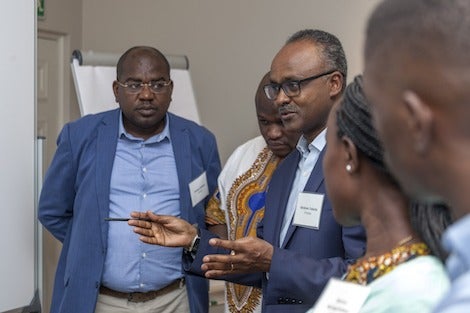December 17, 2018 – A three-day roundtable in Johannesburg, South Africa, hosted by the Harvard Ministerial Leadership Program, focused on how to improve the health and education of young people across Africa so that they’re better equipped to make productive contributions to the economy.
The Harvard Ministerial Roundtable for Policy Innovation in Human Capital Development brought together 24 current and former government ministers from across Africa and a similar number of young African achievers who, together, represented a wide swath of government and economic sectors, including finance, economic planning, education, and health.
The roundtable is the latest offering from the Harvard Ministerial Leadership Program, a joint initiative of Harvard T.H. Chan School of Public Health, Harvard Kennedy School, and Harvard Graduate School of Education. The program convenes annual ministerial forums at Harvard and provides ongoing support for ministers of health, education, and finance from Africa, Southeast Asia, and Latin America, to enhance their leadership effectiveness and political acumen. The Johannesburg event provided the ministers—who had all participated in ministerial forums at Harvard over the past three years—with the opportunity to develop joint approaches to optimizing Africa’s human capital with a cross-section of young African achievers including entrepreneurs, educators, health practitioners, and community workers.
Although countries across Africa have made significant strides in recent years in improving access to education and raising educational standards, there’s still a long way to go. Only an estimated 45% of Africans graduate from secondary school. As a result, rates of youth unemployment are high and the female workforce is largely underutilized. It’s estimated that Africa uses only about 55% of its human capital. Experts say that Africa’s failure to benefit more fully from the talents of its young people is costing the continent dearly. According to estimates from the World Economic Forum, optimizing human capital investment could increase annual average African gross domestic product by $95 billion.
Roundtable participants discussed strategies to boost the health and education of the in-school generation in Africa. They also explored ways to create opportunities for income creation and entrepreneurship among the two-thirds of Africans under age 30 who are currently unemployed. Other topics discussed at the Roundtable included gender inequity in education and employment, barriers to economic participation by women, and the role of technology in innovation and in changing the nature of work.
–Michael Sinclair
Photo: Philip Schedler
